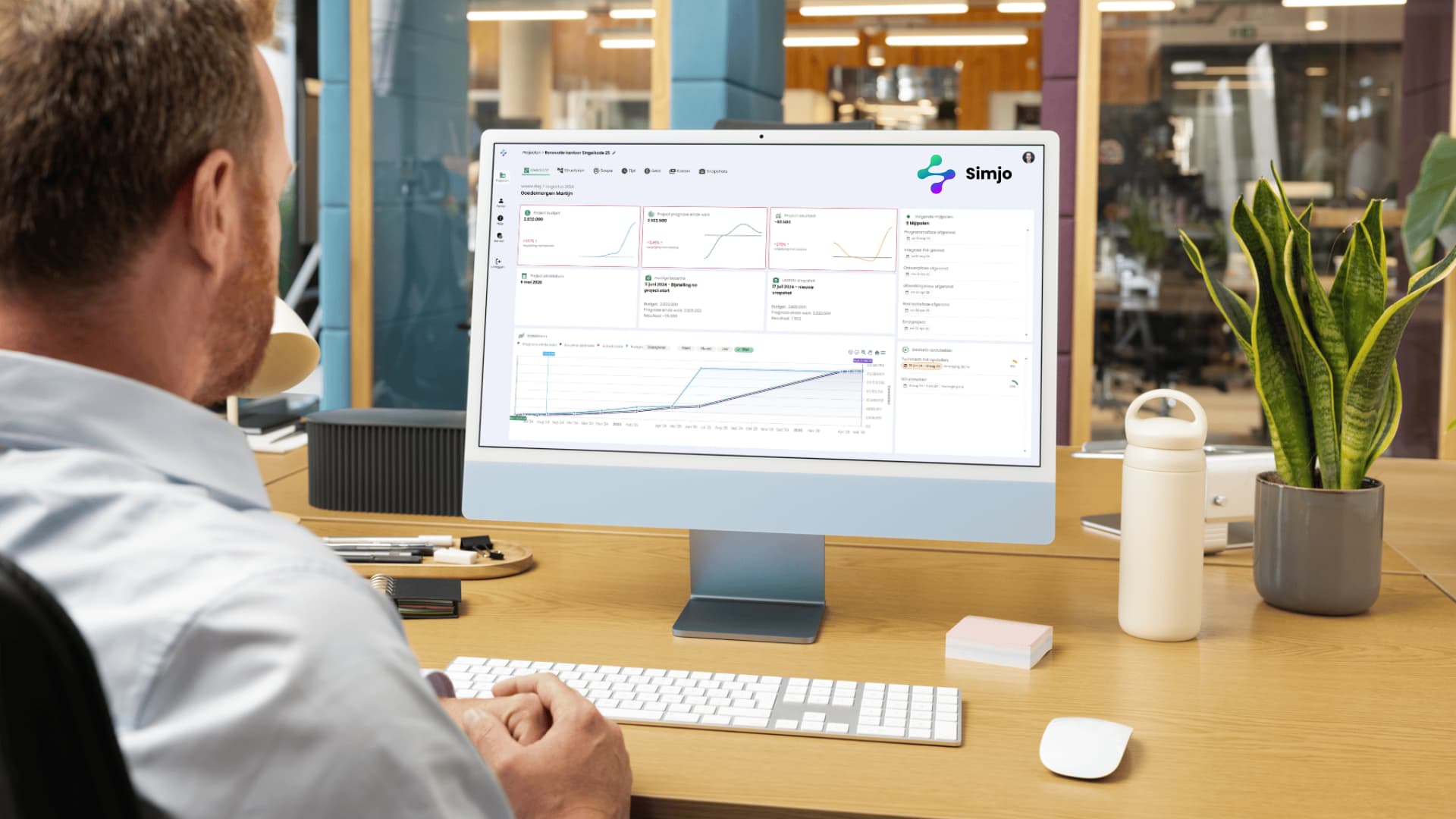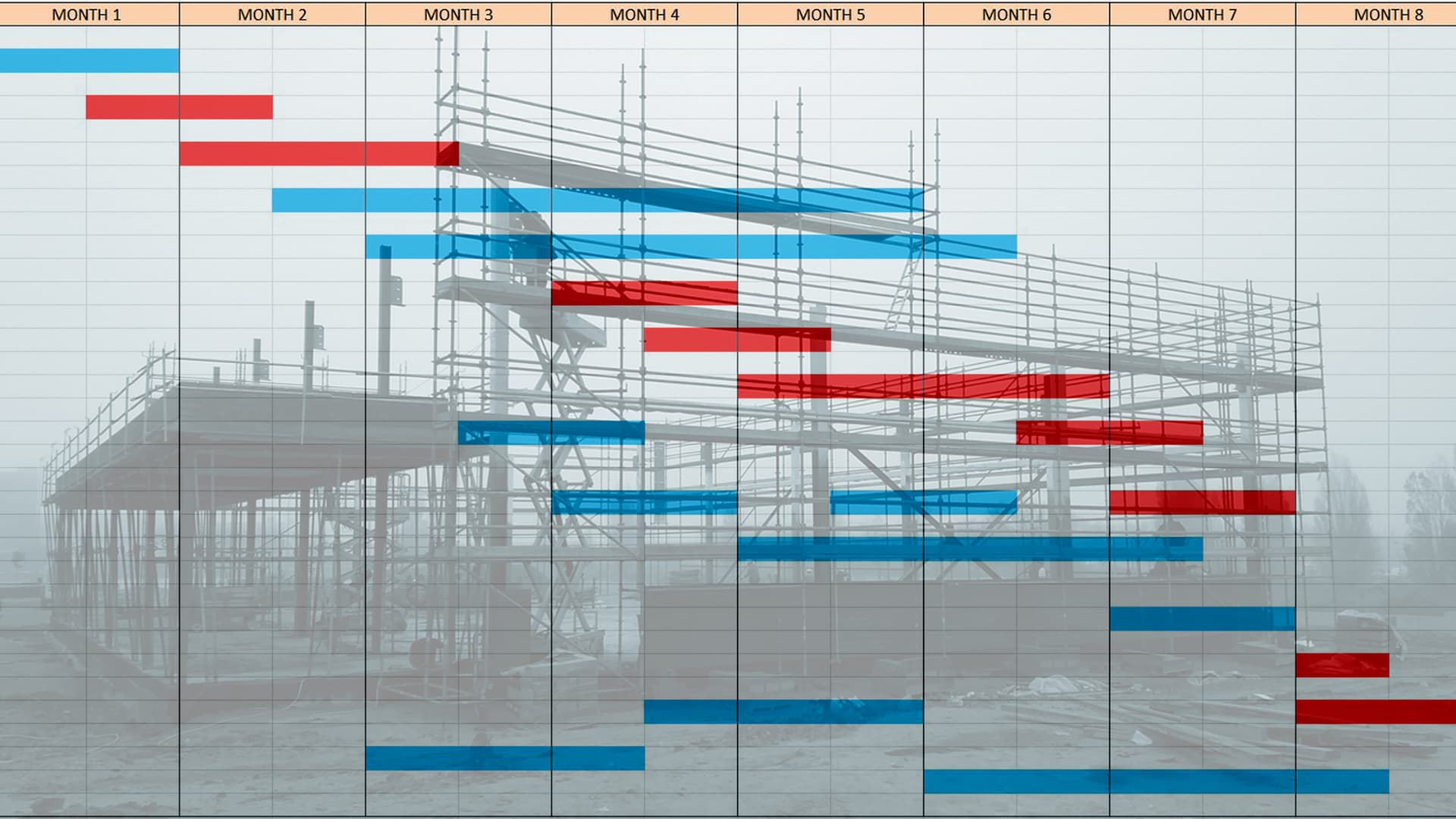Blogs
4 Typical challenges in construction project management and how to deal with them

There are typical challenges and bumps that construction project managers face. And often they cause the project to deviate from the plan. What are some of these challenges? And more importantly, how do you deal with them? Founders of Simjo Martijn Jongen and Richard van Milt explain.
1. Changing circumstances and teams
Construction projects often have to deal with changing circumstances during the project. Construction projects take a long time and the environment is constantly changing as well.
Therefore, it often happens that project objectives are adjusted. This in turn can have a major impact on the scope of the project and therefore also on the schedule and budget.
In construction, teams often change in composition as well. At the beginning of the project, much attention is paid to getting a team with relevant experience in place. But again, the long lead time of projects plays a role. Because it is almost insurmountable to maintain that team for years during such an entire project.
These typical changes in the project team are challenges project managers in construction often face.
2. Emerging uncertainty and risks
Other challenges and bumps that construction project managers face are uncertainty and occurring risks that were not on the radar beforehand.
You may try to have a clear picture of all possible risks at the start of the project. This is especially important when you are working on a plan. The experience of the team is very important as well because it allows you to identify certain risks.
However, during the project other risks always occur. You did not identify these beforehand either, so you did not formulate any control measures. And then you have to adjust your plan.
3. Long duration of construction projects
Perhaps the most important pain point that construction project managers face is that construction projects generally take a long time. If you’re talking about a construction project – whether it’s in the housing market or non-residential construction – you’re quickly dealing with a period of five years. And sometimes even longer.
That also means that the learning curve and possibilities for innovation are slow.
4. Lack of good management information
We often see a lack of good management information in construction projects.
In project organizations, of course, a lot of data is developed and generated these days. Yet you can only use it to a limited extent in terms of managing your project. Because the data is stored in different tools or sources. You can correct a lot with dashboard tools, but that often does not solve the underlying problem.
This is an unnecessarily limiting factor for controlling projects. Ideally, you control your construction project based on current data that are integrally connected in terms of scope, time, and money.
So that you can see the impact on the budget as soon as something changes in your scope. Or what effect a change in your scope has on the planning and delivery of your project.
How can you manage a construction project differently?
In the ideal world, you manage your construction project with real-time data about scope, time, and money. This is only possible when that data is captured in a single tool.
You also need to be able to trust that the data shows the current state of affairs. On this basis, you can then look ahead and make the right choices for your project.
Of course, you also want that data to be accessible, both to your team and to people outside your team such as clients or subcontractors. Especially then it is important that the tooling is easy to use. And that you integrate it easily into the work process so that it does not take too much effort to access it.
Because the moment you see that everyone is on the same information level, you can learn from each other’s experiences and knowledge from there. And that means already transferring knowledge during the project and thereby also accelerating your learning curve exponentially.
Tips for dealing with change in your construction project
1. Communication with stakeholders
One of the most important tips for dealing with challenges in your construction project is to have accessible and simple ways of communicating with stakeholders in your project. These short lines are essential to manage expectations regarding your project.
This allows you to quickly anticipate circumstances. And it allows you to communicate the impact of those circumstances with your client more quickly.
2. Being agile
The chance of a successful construction project is greatest if your construction project is agile in a changing environment. To master this art, it is important to have a solid basis.
That means that you have an integral picture of the scope, time (planning), and budget of your project. That is the basis from which you can introduce changes in the most structured way possible.
3. Recalibrate scope, time, and budget in case of change
With every change you ask yourself: what does this mean for the scope of my project? Is it additional scope? Or is it a change to the existing scope? Doing so helps to have a clear picture of the background of the change and why it is needed.
Then determine what activities are needed, what costs are associated with it, and, last but not least, how the change will affect the schedule and budget.
KPIs of construction project: scope, time, and budget
Having a clear insight in the performance of your project asks for clear overviews of the current situation compared to earlier moments in time. That earlier moment in time must be an anchor point.
That way, every party involved has insight into the scope of the project, what the schedule looks like, and what the project will cost at any given moment. We call such an anchor point the baseline.
The most important key performance indicators (KPIs) of construction projects are scope, time, and budget. You always compare the current situation on those three KPIs with your baseline. And you get the best insight if you do this at different levels of abstraction.
Oftentimes, projects have different types of activities or work packages. Then it is very useful to know whether you are meeting the schedule for the project as a whole. But for the correct management of your project, it is also very helpful to know if you meet the planning of these different underlying activities or work packages.
Do you also want to discover how Simjo supports your construction project?
Simjo is project management software developed specifically for project managers and project teams in construction. See how Simjo simplifies your work here. Or sign up as a Simjo tester. We will keep you informed about the development of Simjo and you will be one of the first to use new functionalities.









